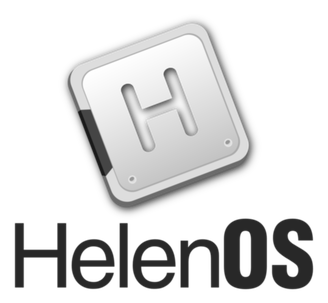HelenOS: Difference between revisions
No edit summary |
Jiri Svoboda (talk | contribs) Describe the developer community |
||
| Line 27: | Line 27: | ||
== Development == |
== Development == |
||
HelenOS is |
HelenOS development is community-driven. The developer community consists of a small core team, mainly staff and former and contemporary students of the Faculty of Mathematics and Physics at [[Charles University in Prague]], and a number of contributors around the world<ref>[http://www.ohloh.net/p/helenos/contributors HelenOS Contributors measured by Ohloh]</ref>. In 2011, HelenOS participated in the Google Summer of Code as a mentoring organization<ref>[http://www.google-melange.com/gsoc/accepted_orgs/google/gsoc2011 Accepted organizations for Google Summer of Code 2011]</ref>. |
||
The [[source code]] of HelenOS is published under the [[BSD licence]], while some third-party components are available under the [[GNU General Public License]]<ref>[http://www.ohloh.net/p/helenos/analyses/latest HelenOS analysis by Ohloh]</ref>. Both of these licences are [[free software licences]], making HelenOS [[free software]]. |
The [[source code]] of HelenOS is published under the [[BSD licence]], while some third-party components are available under the [[GNU General Public License]]<ref>[http://www.ohloh.net/p/helenos/analyses/latest HelenOS analysis by Ohloh]</ref>. Both of these licences are [[free software licences]], making HelenOS [[free software]]. |
||
Revision as of 14:33, 30 March 2012
 | |
| OS family | Multiserver operating systems |
|---|---|
| Source model | Open source |
| Latest release | 0.4.3 / March 26, 2011 |
| Repository | |
| Platforms | IA-32, AMD64, IA-64, ARM, MIPS, PowerPC, SPARC V9 |
| Kernel type | Microkernel |
| License | BSD |
| Official website | www |
HelenOS[1][2] is an operating system based on a multiserver microkernel design. The source code of HelenOS is published under a BSD License.
Technical overview
HelenOS is based on a preemptible microkernel called SPARTAN. The microkernel handles multitasking, memory management and inter-process communication. It also provides kernel-based threads and supports symmetric multiprocessing.
Each process (called task) can contain several threads (preemptively scheduled by the kernel) which, in turn, can contain several fibers scheduled cooperatively in user space. Device and file-system drivers, as well as other system services, are implemented by a collection of user-space tasks (servers), creating thus the multiserver nature of HelenOS.
Tasks communicate via HelenOS IPC, which is connection-oriented and asynchronous. It can be used to send small fixed-size messages, blocks of bytes or to negotiate sharing of memory. Messages can be forwarded without copying bulk data or mapping memory to the address space of middle-men tasks.
Development
HelenOS development is community-driven. The developer community consists of a small core team, mainly staff and former and contemporary students of the Faculty of Mathematics and Physics at Charles University in Prague, and a number of contributors around the world[3]. In 2011, HelenOS participated in the Google Summer of Code as a mentoring organization[4].
The source code of HelenOS is published under the BSD licence, while some third-party components are available under the GNU General Public License[5]. Both of these licences are free software licences, making HelenOS free software.
Hardware support
HelenOS runs on several different CPU architectures including ARM, x86-64, IA-32, IA-64 (Itanium), MIPS, PowerPC (32-bit only), and SPARC V9. At some point in time, various versions of HelenOS ran on real hardware from each architecture (as opposed to running only in a simulator of that architecture).
Support for peripheral devices is mostly limited to keyboards, display devices and simulated disks.
Research and academic use
HelenOS is being used for research[6][7] in the area of software components and verification by the Department of Distributed and Dependable Systems, Charles University, Prague. Besides that, HelenOS has been used by students as a platform for software projects and master theses[8].
References
- ^ HelenOS - the operating system that launched a thousand processes, DistroWatch Weekly, Issue 350, 19 April 2010
- ^ HelenOS nikdy nebude dokončený, říká jeho autor Jakub Jermář
- ^ HelenOS Contributors measured by Ohloh
- ^ Accepted organizations for Google Summer of Code 2011
- ^ HelenOS analysis by Ohloh
- ^ Institutional research plan MSM0021620838 - Modern methods, structures and systems of computer science (2005-2011, MSM)
- ^ Research @ D3S
- ^ Defended HelenOS theses at Faculty of Mathematics and Physics, Charles University in Prague
External links
Further reading
